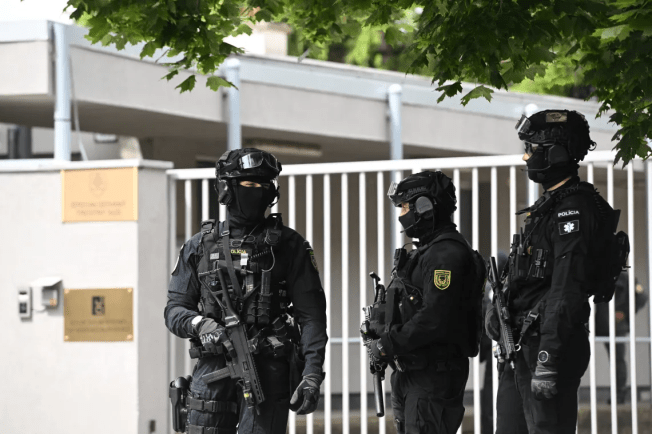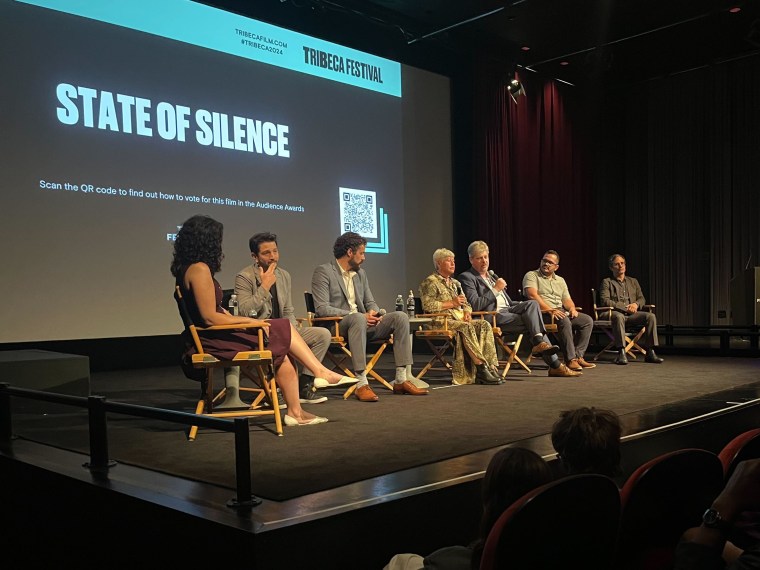The Torch is a weekly newsletter from the Committee to Protect Journalists that brings you the latest press freedom and journalist safety news from around the world. Subscribe here.
On Monday at the Tribeca Film Festival, the Committee to Protect Journalists’ (CPJ) Mexico Representative Jan-Albert Hootsen joined a panel discussion following the global premiere of “State of Silence,” a documentary tracing attacks on journalists in Mexico, and the urgent need to strengthen the country’s federal protection mechanism for the press.
The film, which charts the stories of four journalists in Mexico who have become targets of repression in retaliation for their reporting, and features CPJ’s Hootsen, was directed by Santiago Maza and produced by actors Diego Luna and Gael García Bernal.
“We are getting to the point where we are normalizing what is going on for journalists in my country,” Diego Luna told the New York Times.
According to CPJ, Mexico has been one of the most dangerous countries in the world for journalists for several years.
Read more about the film or our recent report with Amnesty International about Mexico’s federal mechanism.
- Two journalists harassed, assaulted and detained during Flag March in Jerusalem
- Sudanese journalist Makawi Mohamed Ahmed and brother killed during RSF attack
- Cuban journalist Lázaro Yuri Valle Roca released, forced into exile
- South Africa police briefly detain journalist Sandiso Phaliso, force him to delete crime scene photographs
- Journalist says Kenyan official threatened to kill him over report on ambulance shortages
- At least 5 journalists harassed or assaulted covering pre-election events in Mozambique
- Taliban orders shutdown of broadcaster Tamadon TV
- Journalists with The Caravan face retaliatory police investigation in India
- Moscow court orders arrest in absentia of exiled journalist, 2 others face administrative charges
- German police launch criminal probe of video journalist after beating him during pro-Palestinian protest
- Turkmenistan releases journalist imprisoned for 4 years for COVID photo
- CPJ, others call on Slovakia’s Parliament to reject public broadcasting bill
- Pakistan province enacts harsh defamation law, Supreme Court presses legal action against 34 media outlets
- Journalists harassed, obstructed, attacked in Serbia’s election period
Spotlight

In Slovakia, journalists have long endured verbal attacks and harassment from across the political spectrum. During CPJ’s latest visit to the country, which coincided with the May 15 attack on Prime Minister Robert Fico, representatives met with journalists, press freedom advocates, and diplomats in the days surrounding the attack, who described the atmosphere as “depressing,” “toxic,” and “unprecedented.” Several said they saw the attempt on the prime minister’s life as a new chapter in the government’s war on the media.
“Just like after the murder of our colleague Ján Kuciak and his fiancée Martina Kušnírová, we are once again at a crossroads,” the heads of 27 news outlets said in a joint statement condemning the attack, referencing the 2018 killing of Kuciak, likely in retaliation for his journalism on corruption. “This heinous act must not trigger further aggression, verbal attacks and revenge … We must all try to defuse the situation. Otherwise, tension and violence will escalate.”
Almost immediately after the attempted assassination, members of the ruling coalition blamed the attack on journalists, citing their critical coverage, and issued retaliatory threats.
CPJ representatives met Kuciak’s parents, Jozef and Jana Kuciak, at a memorial for the journalist in Bratislava’s historic Old Town, where passersby greeted the two who are well-known for their tireless fight against impunity following their 27-year-old Kuciak’s death.
“I am horrified that something like this could happen again,” said Jozef.
Read more here.
What we are reading (and watching)
- With watershed election, Claudia Sheinbaum must address Mexico’s human rights crisis — Jan-Albert Hootsen, Just Security
- ‘Journalism doesn’t stop’: how three local digital media outlets covered historic floods in Brazil’s Rio Grande do Sul — Carolina de Assis, LatAm Journalism Review
- Six ways to stay safe, from journalism safety experts — Twumasi Duah-Mensah, Editor & Publisher
- Agather Atuhaire | Uganda’s Public Whistleblower — Oslo Freedom Forum
Do you have an Amazon Alexa-enabled device? Enable CPJ's flash briefing skill to stay up to date with the latest press freedom news from around the world.
